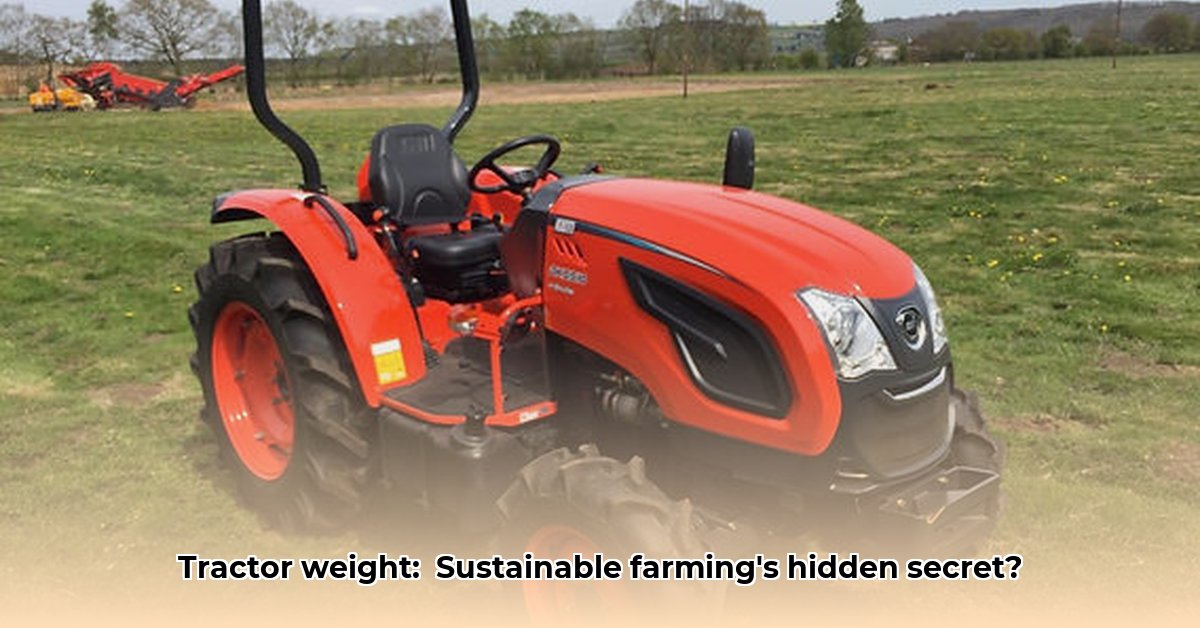
Tractor Weight: A Key Factor in Sustainable Farming
Choosing the right tractor is a pivotal decision for any farmer, particularly those committed to sustainable practices. A tractor's weight isn't just a random number; it profoundly impacts fuel consumption, soil compaction, and the overall environmental footprint of your operation. This guide explores the complexities of tractor weight, offering a comparative analysis to help you make informed choices. Understanding the interplay between weight, power, and sustainability is crucial for long-term farm success. For more information on tractor costs, see tractor prices.
What Influences a Tractor's Weight?
Several factors determine a tractor's weight, and understanding these helps you select the most appropriate model for your needs:
Farm Size: Larger farms often require the power of heavier tractors to handle extensive acreage and heavy workloads efficiently. Smaller farms might find lighter tractors more maneuverable and cost-effective.
Soil Type: Heavy clay soils are highly susceptible to compaction. Lighter tractors, often equipped with wider tires, minimize soil disturbance and maintain soil health. Conversely, sandier soils may tolerate heavier machines.
Crops Grown: Different crops have varying sensitivities to soil compaction. Intensive crops like vegetables may benefit from lighter, less compacting tractors.
Farming Practices: No-till farming, a key component of sustainable agriculture, requires tractors that minimize soil disturbance. Lighter models align perfectly with this approach.
Budget: Heavier tractors generally come with a higher purchase price and greater maintenance costs. Weigh this against the long-term productivity and fuel efficiency before reaching a decision.
Sustainable Farming and Tractor Weight: Minimizing Environmental Impact
Sustainable farming emphasizes minimizing environmental impact, and tractor weight plays a significant role. Lighter tractors generally consume less fuel, resulting in lower greenhouse gas emissions and reduced operating costs. Their reduced soil compaction promotes better water infiltration, enhancing soil health and reducing the need for fertilizers.
"Choosing a lighter tractor can significantly decrease soil compaction, leading to healthier soils and reduced reliance on chemical fertilizers," says Dr. Emily Carter, Agricultural Engineer at the University of California, Davis.
Choosing the Right Tractor Weight: A Practical Guide
Selecting the optimal tractor weight involves a systematic process:
Assess Your Farm: Carefully evaluate your farm's size, soil type, typical farming tasks, and crop types. Identify your biggest challenges and priorities.
Research Tractor Models: Explore different tractor models, paying close attention to their weights and horsepower ratings as provided by the manufacturer. Compare specifications between brands and models to find the best fit.
Prioritize Fuel Efficiency: Consider factors beyond simple MPG (miles per gallon), including engine technology and transmission type. Newer technologies often offer significant improvements in fuel economy.
Explore Equipment Sharing: Collaborate with neighboring farms to share equipment, reducing individual investment costs and minimizing the number of tractors needed.
Investigate Government Incentives: Research government programs and subsidies that may support the purchase of fuel-efficient or environmentally friendly agricultural equipment.
Light vs. Heavy Tractors: A Comparative Analysis
The following table summarizes the key differences between light and heavy tractors:
| Feature | Light Tractor | Heavy Tractor |
|---|---|---|
| Soil Compaction | Minimal | Significant |
| Fuel Efficiency | Excellent | Lower |
| Maneuverability | High | Lower |
| Purchase Price | Lower | Higher |
| Maintenance Costs | Generally Lower | Generally Higher |
| Power for Large Farms | May be insufficient for large fields | More than sufficient |
| Versatility | May require specialized attachments | Generally more versatile |
Fuel Efficiency: The Key to Sustainable Tractor Operation
Fuel efficiency is paramount for sustainable farming. It directly impacts operating costs and the environmental footprint of your operations. Beyond simply focusing on MPG, consider factors such as:
Engine Technology: Advanced engine management systems and power-on-demand capabilities significantly improve fuel efficiency in modern tractors.
Transmission Type: Efficient transmissions minimize power loss, resulting in better fuel economy.
Tire Pressure: Maintaining optimal tire pressure reduces rolling resistance and improves fuel consumption.
Alternative Fuels: Biodiesel and electric tractors offer potential alternatives, although their higher initial costs and other limitations (such as range for electric tractors) need careful consideration.
Making the Right Choice: Your Sustainable Future
Selecting the right tractor is a long-term investment. Thorough planning, careful assessment of all factors, and a deep understanding of your specific needs are all critical elements in making a sustainable and economically sound decision. Remember that a sustainable tractor choice fosters both environmental stewardship and long-term profitability. Don't rush — a well-informed decision today lays the foundation for a thriving, sustainable farm for years to come.